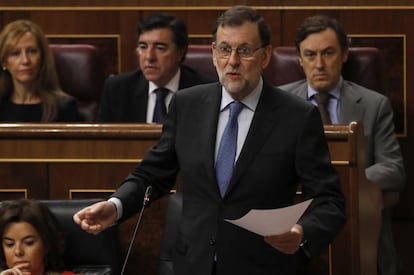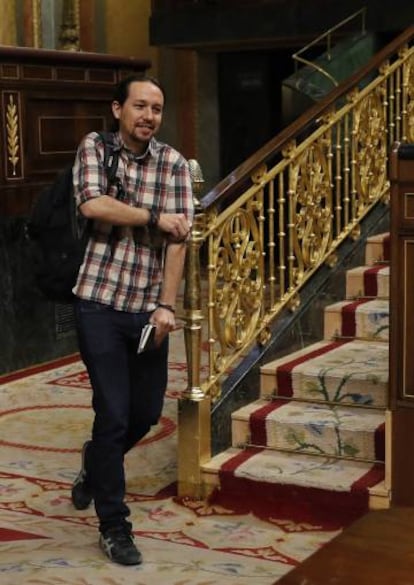Bullish Spanish opposition calls on government to repeal “gag law”
Socialist-sponsored motion has no binding power but shows that PP no longer controls the lower house
The Spanish Congress on Tuesday asked the government to repeal a controversial public safety law that was passed when the Popular Party (PP) still enjoyed an absolute majority. Known popularly as the “Gag Law” because of its crackdown on public protest, the Citizen Safety Law was widely criticized both before and after it came into effect, in July 2015.

But now that the PP heads a minority government, the opposition is moving to undo the conservatives’ legacy.
For now, the resolution approved on Tuesday has symbolic and political value only. Introduced by the Socialist Party (PSOE), it is a statement of purpose that would require cross-party agreement in order to become a bill.
The PP said it rejects the resolution because of the terrorist threat in Spain
The Socialist-sponsored document states that the law should be rolled back because of “its direct and negative impact on the exercise and development of fundamental rights.”
The document asks instead for a new law that will ensure that sanctions against conduct that is detrimental to citizen safety will be “proportional.”
Only the PP voted against the non-binding resolution, while Ciudadanos abstained on the specific point relating to a repeal of the law after the PSOE refused to accept an amendment to the text.
The PP spokesman in Congress, José Alberto Martín Toledano, said his party was rejecting the resolution because of the terrorist threat in Spain, and added that the existing law already guarantees people’s fundamental rights.

The Citizen Safety Law was one of the most controversial pieces of legislation passed by the first Mariano Rajoy administration (2011-2015). Its new penalties for activities like protesting outside Congress or taking photographs of police officers led critics to claim that it seemed tailor-made for specific forms of peaceful protest in Spain, such as those staged by anti-eviction activists, labor unions and victims of preferred share schemes.
Energy poverty
Also on Tuesday, the leftist coalition Unidos Podemos obtained a majority in Congress to approve a motion of its own, asking the government to prohibit utilities from cutting off electricity from vulnerable clients without first reporting such cases to social services.
While this resolution also lacks any legal power, it confirms Podemos’ commitment to addressing energy poverty in Spain. The move comes shortly after a well-publicized case of an elderly woman who died inside her home in Catalonia after her bed caught fire: she had been using candles after her electricity was cut off.
In a third symbolic show of force from the opposition, Ciudadanos secured enough support to pass a motion against a tax amnesty introduced by the previous PP administration.
English version by Susana Urra.
Tu suscripción se está usando en otro dispositivo
¿Quieres añadir otro usuario a tu suscripción?
Si continúas leyendo en este dispositivo, no se podrá leer en el otro.
FlechaTu suscripción se está usando en otro dispositivo y solo puedes acceder a EL PAÍS desde un dispositivo a la vez.
Si quieres compartir tu cuenta, cambia tu suscripción a la modalidad Premium, así podrás añadir otro usuario. Cada uno accederá con su propia cuenta de email, lo que os permitirá personalizar vuestra experiencia en EL PAÍS.
¿Tienes una suscripción de empresa? Accede aquí para contratar más cuentas.
En el caso de no saber quién está usando tu cuenta, te recomendamos cambiar tu contraseña aquí.
Si decides continuar compartiendo tu cuenta, este mensaje se mostrará en tu dispositivo y en el de la otra persona que está usando tu cuenta de forma indefinida, afectando a tu experiencia de lectura. Puedes consultar aquí los términos y condiciones de la suscripción digital.








































